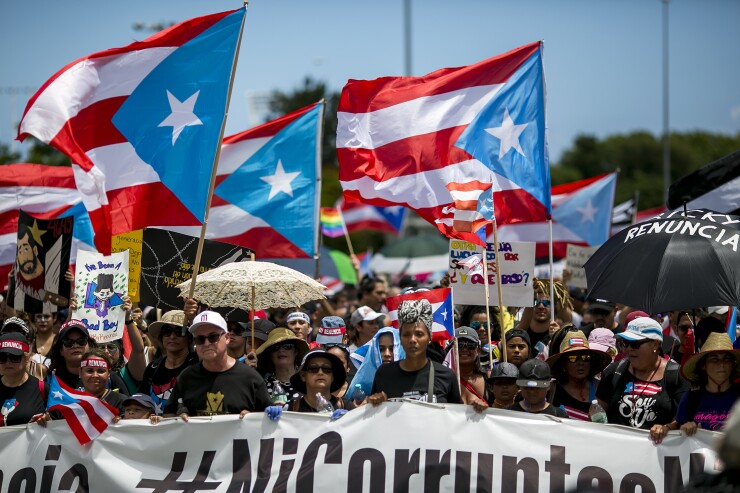The CEOs of Puerto Rico’s two largest banks said this week that ongoing protests over government corruption and other political scandals are threatening to delay the island’s recovery from the devastating hurricanes of 2017.
Thousands of demonstrators took to the streets of San Juan last week after two top government officials were arrested for allegedly steering more than $15 million in hurricane relief aid to unqualified, politically connected contractors.
The crowds grew significantly larger after the Center for Investigative Journalism published group messages between Gov. Ricardo Rosselló and other officials that included off-color comments about political rivals and hurricane victims that many citizens found offensive. Rosselló said late Wednesday that he will step down on Aug. 2.

In an earnings call with analysts Wednesday, Ignacio Alavarez, the chairman and CEO of the $50.6 billion-asset Popular, said that cruise ships have been unable to dock in San Juan since the protests began, dealing a heavy blow to local tourism.
"We’ve lived through a lot of political uncertainty the last two weeks," Alvarez said. "There have been short-term disruptions."
Aurelio Alemán, the CEO of the $12.5 billion-asset First BanCorp., has defended the protests but told analysts Tuesday that the island’s recovery could be delayed by the upheaval.
“Definitely, we are somewhat concerned with the political headlines and the potential impact that could have on economic activity in the short term,” Alemán said. “We do remain hopeful that this will resolve in the short term and ultimately lead to greater transparency from the government.”
Puerto Rico’s economy was already struggling when Hurricanes Maria and Irma tore through the island two years ago, killing nearly 3,000 residents and causing an estimated $100 billion in damage. Scores of citizens who left the island in the wake of the storms have yet to return and many who remain are mired in poverty.
Still, Puerto Rico’s Oversight Board, which was created to manage the island’s debt problems stretching back years, last year forecast a bounce-back in the economy through 2023, boosted in large part by disaster relief aid.
Popular and FirstBank, meanwhile, are once again generating steady profits after suffering through some rough quarters in the wake of the hurricanes.
FirstBank on Tuesday reported net income of $41.3 million in the second quarter, up 33% from the same period last year. Popular's net income fell to $171.1 million from $279.7 million a year earlier, though last year’s results were skewed by a one-time gain tied to an acquisition.
FirstBank also recently released $6.4 million from its reserves for loan losses tied to the storms’ damage, and Popular executives have said that reserves are back down to pre-hurricane levels.
On earnings calls this week, analysts expressed concern that the U.S. government could cut off aid to the island as a result of the protests, though Alvarez downplayed such worries. He also said he doesn’t expect the economy to suffer any long-term damage from Rosselló's anticipated resignation and transition of power to a new governor.
Even so, Alemán said that the events of the past couple of weeks have been a setback for the island.
“The island continues to move ahead,” Alemán said. “But there is a clear disruption in the administration that we cannot ignore.”





